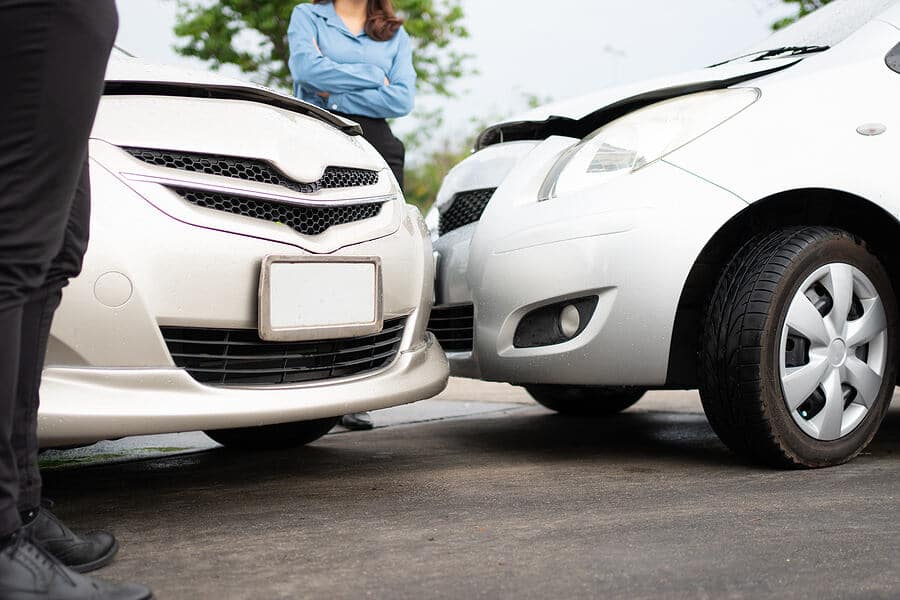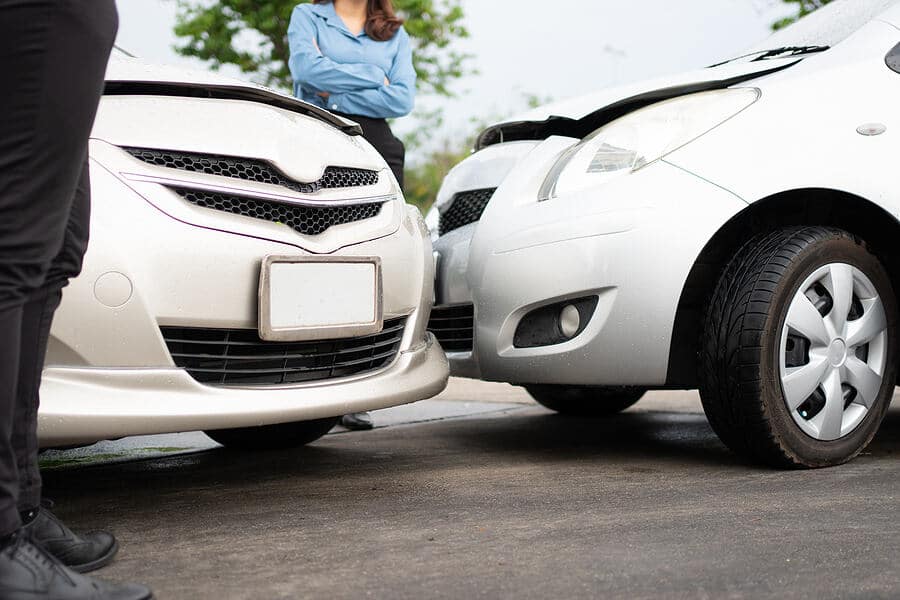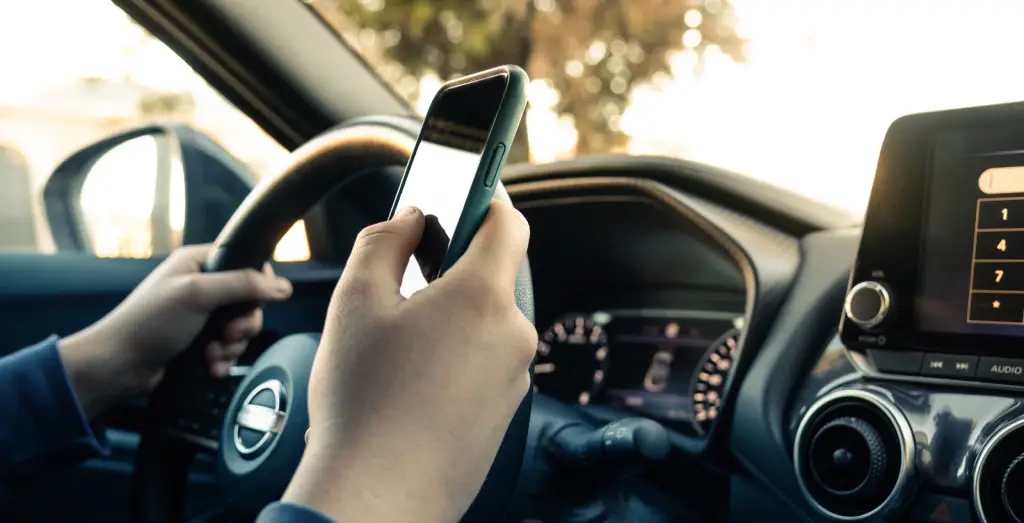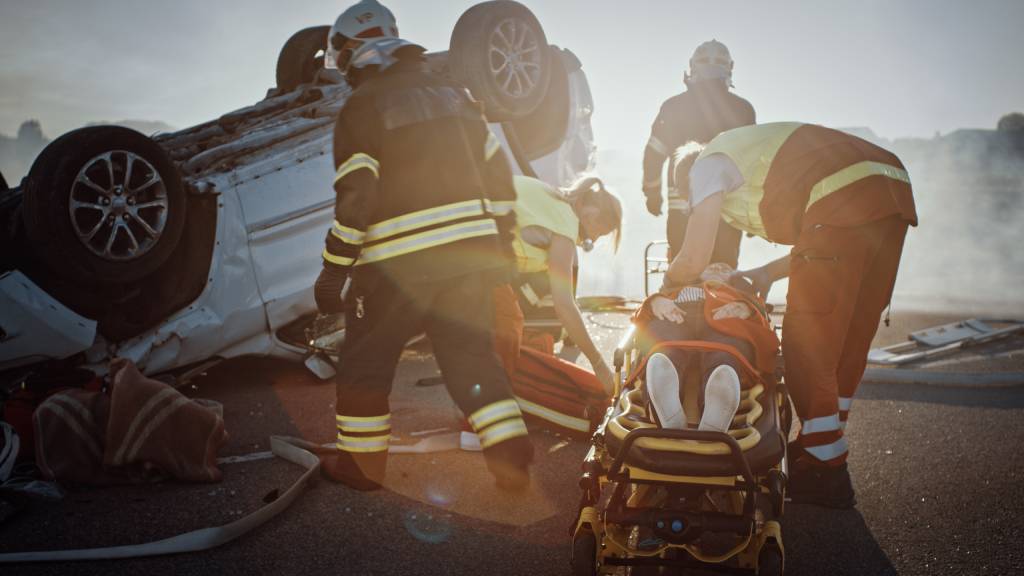A fender bender is a minor accident with another vehicle. You may even wonder if anyone will notice. You may consider driving away without exchanging information with the other driver or reporting the accident.
In most cases, California law requires you to take certain steps after an accident, even a minor one. In addition to your legal duties under state law, you and your insurer may also be responsible for damages or injuries.
Read on to learn whether a minor accident counts as an accident and if you should contact a car accident lawyer.
What Are Fender Benders?

Generally, a fender bender refers to an accident between two cars that often doesn’t result in serious injuries, typically with limited harm to the vehicles. In a fender bender, both cars are able to drive off after the incident. Any damage to a vehicles’ exterior is typically minor.
If you’ve been injured in a fender bender or other type of accident, we strongly advise you to contact an attorney.
Injured? Speak with An AttorneyOther definitions of a fender bender include:
- A property damage only (PDO) accident with no injuries or fatalities
- An accident that causes only minor property damage and minor injuries
- An accident where your car remains drivable, regardless of injuries
- A minor accident involving an unattended vehicle
- A low-speed accident
In California, accidents are classified as PDO, injury, or death. When you file a DMV accident report or an office investigates the report, the accident is always classified by the worst outcome.
For example, if an accident that damaged property and injured a passenger occurred, it would be classified as “injury”, even though neither driver was injured.
Does a Minor Accident Count as an Accident to the Prosectors?
Leaving the scene of an accident without reporting it is a serious crime. If you only damaged property, you could face misdemeanor charges. If you are convicted, you could get a jail sentence of up to six months and a fine of up to $1,000.
Fleeing the scene of an accident that caused an injury or death could lead to hit-and-run charges.. If convicted, , a judge could sentence you to up to one year of imprisonment and a fine of up to $10,000.
If you caused a serious, permanent injury or death, a judge could increase the sentence to include up to four years in prison.
Prosecutors do not take the value of damaged property into account when determining whether to file charges against you. . If you damaged property or caused an injury, prosecutors could bring charges against you.
Even if you back into another car in a parking lot and the vehicle was damaged, you must remain at the accident scene or leave a note even if the damage appears minor. Otherwise, this will likely be viewed legally as a hit-and-run.
Does a Minor Accident Count as an Accident Count as an Accident to the Police?
Your duty to report an accident depends on whether anyone was injured or killed in the accident. If someone suffered injury or death, you must report the accident to the police, even if you only caused minimal property damage.
For example,, you must report an accident that injured a pedestrian or cyclist, even if the accident only dented your fender. You are obliged to report all injury accidents, regardless of the value of any property damage.
You do not need to call the police for a PDO (property damage only) accident unless you hit an unattended vehicle. If you hit an unattended vehicle and cannot find the owner, leave a note on the vehicle and report the accident to the police.
BIn many urban counties, the police will not respond to PDO accidents or even include them in the accidents they report to the state ,even if you do report the accident.
Should I report a minor accident to my insurer?
It’s important to important to be transparent with your insurer about an accident, even if it’s a minor one.
Since California uses a fault-based auto insurance system, insurance premiums go up every time you cause an accident, even a minor one. This may deter some people from reporting an accident to their insurer. But failing to report and accident risks costly consequences.
All auto insurance policies require you to report all accidents. Failing to report an accident in the timeframe outlined in your policy amounts to a breach of policy. . Worse yet, the insurer can deny all liability for the unreported accident.
If the other driver suffered an injury, you—not your insurer—will need to pay the other driver’s losses. Remember, not all injuries are visible immediately after impact. For example, a driver who appears well after an accident may develop a brain injury in the hours or days after the accident.
Even if the other driver was uninjured,, you could face e severe consequences if you don’t report the accident. If the other driver files a claim with your insurer, the insurer might deny the claim. Instead of relying on the insurer to cover the other driver’s property damage expenses, you would bear those costs.
Does a Minor Accident Count as an Accident in Injury Claims?
You might assume a minor accident will not result in an injury. But even a small accident can injure another driver, passenger, pedestrian, or cyclist.
Car accident lawyers often talk about the eggshell skull plaintiff. Under this rule, a driver bears liability for all injuries caused by a car accident. This liability extends to unforeseen or unusual injuries resulting that from the accident victim’s unique susceptibility to injury. This means, if another driver is easily injured, perhaps because of a medical condition their injuries should not be disregarded.
Injury lawyers often summarize this rule as “you take the other driver as you find them.” This means all drivers – even ones who are injured easily – can recover compensation for their bona fide injuries just as anyone else could.
When the accident victim’s car accident attorney files an insurance claim or lawsuit against you, the minor nature of the accident will not provide a defense. If the accident victim proves you caused the injury, you and your insurer must pay for the resulting damages.
The other party may also claim for the following:
- Medical expenses
- Lost wages
- Diminished earning capacity
- Physical pain (separate from injury)
- Inconvenience
- Mental anguish
- Reduced enjoyment in life
- Inability to participate in activities
How to Begin the Process of Hiring a Lawyer?
Taking the first step and getting in touch with a qualified personal injury lawyer will put you ahead in the process. A lawyer will be able to discuss the options you have and how you will benefit from taking action.
What to do After a Minor Accident
California imposes several legal duties on drivers after an accident, no matter how minor.
If the accident causes injuries or fatalities, you must:
- Stop at the accident scene
- Assist anyone injured in the accident
- Exchange identifying information with the other drivers
- Report the accident to the police and the DMV
If you take these steps, your legal duties under California law have been satisfied. This means, you can’t be charged with a hit and run.
If your accident only damages property, you must:
- Stop at the accident scene
- Exchange identifying information with the other drivers
You must report PDO accidents to the DMV if the value of the damage exceeds $1,000. Failing to report an accident to the DMV could result in license suspension.
Call the police. This will prevent any accusation that you failed to report the accident.
If you damage unattended property, attempt to find the property owner, leave a note, or report the accident to the police if you cannot identify the property owner.
Always contact your insurer after a minor accident to get ahead of anyone else who may file a claim. . If you do not report the accident first, your insurer might deny coverage and expose you to a lawsuit from the accident victim.
When to Call a Car Accident Lawyer After a Minor Accident
For most minor accidents, you will not need a car accident attorney. But in some situations, you should speak to a lawyer before taking any action.
You Suffered an Injury
Consider contacting a car accident lawyer if you suffered an injury in a minor car accident. That the accident caused minimal property damage will not protect the at-fault driver from liability.
An attorney can help you file an insurance claim and negotiate with your insurer to get you a fair settlement. If the lawyer cannot settle the claim, they can prepare a lawsuit against the at-fault driver.
Insurers always defend their policyholders. But if you can prove the other driver was negligent, a jury will likely award damages.
Someone Blames you for the Accident
It’s not uncommon for another driver to attempt to deflect blame. . If the insurer or another driver points to you as the driver at fault, consider talking to a car accident attorney.
Often, insurers blame you when denying your claim. In other words, if you file an injury claim against the other driver, the insurer can deny your claim because you caused the accident.
Insurers may also do this to attempt to reduce your claim. California uses comparative fault to allocate damages after an accident. Under this rule, an insurer can reduce your claim in proportion to your share of the blame.
A lawyer can dispute blame shifted to you, ensuring you get a full and fair settlement or damage award for your injuries.
You Received a Low Settlement Offer
Insurers have a legal duty to pay claims that fall within the insurance policy, but they still have financial incentive to pay as little as possible. . As a result, an insurer may make a very low settlement offer, even for a minor accident. In some cases, insurers do not offer enough to cover your documented medical expenses.
Even minor injuries can incur significant medical bills. An ambulance ride, emergency room visit, and X-rays can cost thousands of dollars even if doctors find only a strained neck.
A lawyer can evaluate your claim to determine a fair offer.
Choosing a Car Accident Lawyer
Most injury lawyers offer a free consultation to new clients. Use this consultation to get feedback on your case and interview the lawyer.
If the lawyer feels you have a claim worth pursuing, you can discuss their experience with similar cases. Talk to the lawyer about the legal fees charged for handling your case.
If you were injured in a car accident, no matter how big or small, contact one of our top-rated California car accident lawyers at (866) 622-6491 today. Our team of award-winning auto accident attorneys is here to handle your car accident personal injury claim effectively. It all starts with a free consultation.
Frequently Asked Questions
If you’ve recently been involved in a fender bender, you likely have questions. The May Firm Renewal is here to help you. Explore some commonly asked questions below:
Is there such thing as a hit and run fender bender?
Yes, there is such a thing as a hit and run fender bender. When determining whether to file charges, prosecutors do not take into account the value of any damaged property. So, even if damage was minimal, a fender bender could still be considered a hit and run.
What should I do after a fender bender in a parking lot?
Exchange information with the other driver. If the vehicle is parked, wait for the other driver to return. If the other driver does not return, leave a note with your details. Take photographs of the damage to both vehicles and report the accident to your insurer. Try not to make any statements that could be interpreted as admission of fault.
Should I file an insurance claim for bumper damage?
If you were the only driver involved and the damage is minimal, it may be best to pay out of pocket to avoid any premium increases. If another driver was involved, it’s best to contact your insurance, especially if there was any chance of injury.
Who is at fault in a fender bender?
Like any car accident, the person at fault in a fender bender varies from situation to situation. California is a comparative fault state, meaning you may be to blame for a portion of the accident, and so might the other driver involved.
If you have any doubt about who is to blame for your accident, schedule a free consultation with the May Firm today. We can help you determine the best cause of legal action to get the best possible outcome for your accident.



